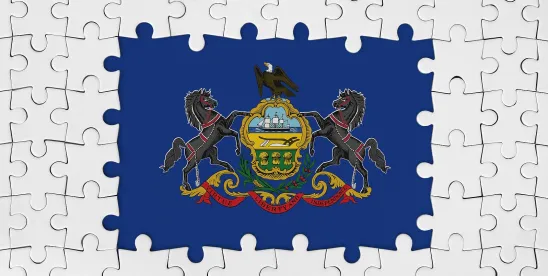Noncompete agreements have come under attack at both the federal and state level. Attention has been focused on the Federal Trade Commission’s (“FTC”) final rule Non-Compete Clause Final Rule prohibiting non-compete agreements (“Final Rule”), which takes effect Sept. 4, 2024. The Final Rule contains several exceptions to the noncompete ban, including for nonprofit companies (such as hospital networks). But some states, such as Pennsylvania, are taking steps to extend the noncompete prohibitions and restrictions to the healthcare industry, including to nonprofit health care organizations that are exempt from the FTC Final Rule.
On July 17, Pennsylvania Gov. Josh Shapiro signed into law House Bill No. 1633, referred to as the “Fair Contracting for Health Care Practitioners Act” (the “Act”), which prohibits the enforcement of noncompete covenants entered into between health care practitioners and employers. The Act is the first law in Pennsylvania to limit noncompete agreements in the Pennsylvania health care industry.
In the health care context, the Act states that noncompete covenants “inhibit competition that benefits employees and patients and can deter needed health care practitioners from wanting to practice in Pennsylvania.” Pursuant to the Act, a “noncompete covenant” is “an agreement entered into between an employer and a health care practitioner in [Pennsylvania] which has the effect of impeding the ability of the health care practitioner to continue treating patients or accepting new patients, either practicing independently or in the employment of a competing employer, after the term of employment.” The Act applies only to health care practitioners, defined to include only licensed physicians (“MD”/“DO”), certified registered nurse anesthetists (“CRNA”), certified registered nurse practitioners (“CRNP”), and physician assistants (“PA”).
The Act takes effect on Jan. 1, 2025 (“Effective Date”) and renders noncompete covenants entered into after the Effective Date void and unenforceable as contrary to public policy. Any noncompete covenant entered into prior to the Effective Date would not be subject to the Act. Additionally, the Act provides an exception to allow employers to enforce a noncompete covenant if the duration of the noncompete is no more than 1 year, and the health care practitioner voluntarily terminated employment and was not dismissed by the employer. A noncompete covenant is not enforceable if the employer dismissed the health care practitioner, even if the duration of the noncompete is 1 year or less.
Enforcement of contract provisions allowing employer recovery of reasonable expenses from the health care practitioner is permissible. The Act explicitly states it does not prohibit the enforcement of a provision allowing the employer to recover reasonable expenses from a health care practitioner if the expenses are
- directly attributable to the health care practitioner and accrued within the 3 years prior to separation (unless separation is caused by employer dismissal of the health care practitioner);
- related to relocation, training and establishment of a patient base; and
- amortized over a period of up to 5 years from the health care practitioner’s date of separation.
The Act also does not prohibit noncompete covenants entered into with a health care practitioner who has an interest in a business entity as a direct result of
- the sale of an ownership interest or all or substantially all of the assets of the business entity;
- a transaction resulting in the sale, transfer or other disposition of the control of the business entity, including by merger or consolidation; or
- the health care practitioner’s receipt of an ownership interest in the business entity. Importantly, the health care practitioner must be a party to the sale, transfer, or other disposition; otherwise the preexisting noncompete covenant may be rendered void and unenforceable.
The Act imposes patient notification requirements on the employer. Within 90 days of the health care practitioner’s departure, the employer must notify patients seen by the health care practitioner within the past year, who had an ongoing outpatient relationship with them for two or more years, of the following:
- the health care practitioner’s departure;
- how the patient may transfer the patient’s health records to a health care practitioner other than with the employer, if the patient chooses; and
- that the patient may be assigned to a new health care practitioner within the existing employer, if the patient chooses to continue receiving care from the employer.
The Act is silent regarding geographic restrictions on noncompete covenants. This is interesting, given that the Act explicitly highlights the concern for hospital noncompete covenants that stretch over broad geographic regions as part of the driving rationale. Additionally, it is unclear whether the Act applies to health care practitioners working as independent contractors. Notably, the FTC Final Rule does apply to independent contractors.
The FTC Final Rule is facing numerous challenges, including ATS Tree Services LLC v. FTC, No. 24-cv-01743 (E.D. Pa.), which is currently pending in the United States District Court for the Eastern District of Pennsylvania. If the Final Rule is upheld, it will be interesting to see how it interplays with the Act. Regardless, the Act will take effect on Jan. 1, 2025, and will render any noncompete covenant entered into after this date (that does not qualify for a permitted exception) unenforceable. Pennsylvania health care practitioners (as defined by the Act) and employers must be mindful of the prohibition and restrictions set forth in the Act when drafting, entering into, renewing, and enforcing such provisions, and of the Dec. 31, 2024, deadline for entering new noncompete agreements that can be enforced.




 />i
/>i

